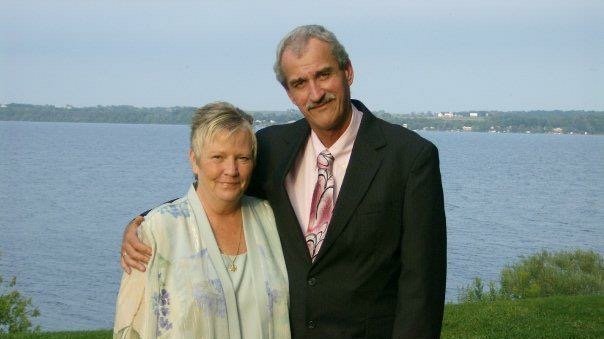After this I looked, and there was a great crowd that no one could number. They were from every nation, tribe, people, and language. They were standing before the throne and before the Lamb. They wore white robes and held palm branches in their hands. They cried out with a loud voice:
“Victory belongs to our God
who sits on the throne,
and to the Lamb.”
All the angels stood in a circle around the throne, and around the elders and the four living creatures. They fell facedown before the throne and worshipped God, saying,
“Amen! Blessing and glory
and wisdom and thanksgiving
and honor and power and might
be to our God forever and always. Amen.”
Then one of the elders said to me, “Who are these people wearing white robes, and where did they come from?”
I said to him, “Sir, you know.”
Then he said to me, “These people have come out of great hardship. They have washed their robes and made them white in the Lamb’s blood. This is the reason they are before God’s throne. They worship him day and night in his temple, and the one seated on the throne will shelter them. They won’t hunger or thirst anymore. No sun or scorching heat will beat down on them, because the Lamb who is in the midst of the throne will shepherd them. He will lead them to the springs of life-giving water, and God will wipe away every tear from their eyes.”
~Revelation 7:9-17
Jesus entered Jericho and was passing through town. A man there named Zacchaeus, a ruler among tax collectors, was rich. He was trying to see who Jesus was, but, being a short man, he couldn’t because of the crowd. So he ran ahead and climbed up a sycamore tree so he could see Jesus, who was about to pass that way. When Jesus came to that spot, he looked up and said, “Zacchaeus, come down at once. I must stay in your home today.” So Zacchaeus came down at once, happy to welcome Jesus.
Everyone who saw this grumbled, saying, “He has gone to be the guest of a sinner.”
Zacchaeus stopped and said to the Lord, “Look, Lord, I give half of my possessions to the poor. And if I have cheated anyone, I repay them four times as much.”
Jesus said to him, “Today, salvation has come to this household because he too is a son of Abraham. The Human One came to seek and save the lost.”
~Luke 19:1-10
Reconciliation is at the heart of the Gospel—a core value and a central commandment we find woven throughout our sacred texts as Christians. The stories of Ishmael, Esau, Joseph, and other spiritual ancestors set the pace, and Jesus makes reconciliation central to the message of the Gospel. Jesus embodied reconciliation by bringing the good news to Jews and Gentiles alike, and he taught us to seek reconciliation with our siblings first before we offer our worship to God (Matthew 5:23-24). In his letter to the Galatians, the Apostle Paul famously wrote: “There is neither Jew nor Greek; there is neither slave nor free; nor is there male and female, for you are all one in Christ Jesus” (Galatians 3:28). And he reminded the believers in Corinth that God “gave us the ministry of reconciliation…[and] trusted us with this message of reconciliation.” (2 Corinthians 5:18-19).
Seeking reconciliation—with God and neighbor—is an integral part of what it means to follow Jesus Christ. But what does reconciliation actually look like? And what does it require of us as white Christians?
One of the most vivid biblical visions of reconciliation comes in Revelation 7. It’s a beautiful vision of a great crowd gathered in heaven before God and the Lamb. The crowd is comprised of people from every nation, tribe, and ethnicity. They’re all dressed in white robes worshiping God with one voice and one heart. It’s a vision of hope for the ultimate fulfillment of all those biblical commandments to be reconciled—to become one in Christ. Revelation 7 reminds us to keep ourselves grounded in a hope deep in our hearts—a hope that this sort of reconciliation is possible even when it seems impossible. And this hope is what it means to be rooted in a faith of the resurrection.
But the end of Revelation 7 hints that arriving at this beautiful scene of reconciliation wasn’t easy or without cost. It says that the diverse crowd gathered before God’s throne “have come out of great hardship” and “washed their robes and made them white in the Lamb’s blood.” In other words, pain and repentance preceded the bliss of reconciliation.
So, what does reconciliation cost us? We can find an answer to that question—or at least the beginning of one—in the story of Zacchaeus in Luke 19. Zacchaeus is a tax collector for the Roman Empire. Today we pay taxes directly to our government. We fill out standardized forms, consult accountants, and our tax laws are debated and voted on by Congress. But in 1st century Israel-Palestine, people paid taxes to an individual like Zacchaeus who had been contracted by the Roman Empire to collect taxes in a specific geographic region. Zacchaeus would have had to personally pay the entire tax up front. That is, the total sum of all the tax due from everyone in that region. It goes without saying, then, that Zacchaeus was rich. Zacchaeus would have likely hired sub-contractors who would do the grunt work of going door to door making the collections. His profit margin was whatever he could collect over and above what he already paid out to the empire up front. Simply put, tax collectors like Zacchaeus made their profit by overtaxing those who could least afford it. More bluntly, they stole from the poor.
Given the depth of the injustices perpetrated by this man, we can understand why the crowd wonders indignantly, “What business does Jesus have getting cozy with this crook, Zacchaeus?”[1] But Jesus understood something they didn’t. Zacchaeus needed to be reconciled. He had alienated himself from God and his neighbors. It’s then and there that Zacchaeus pledged to give half his possessions to the poor and to repay four times anything he’s stolen.
In this simple but powerful pledge, Zacchaeus initiates three critical actions that are prerequisites to reconciliation: confession, repentance, and reparations. First, while his confession of sin isn’t exactly explicit, Zacchaeus admits to stealing. And in this public confession of sin made before Jesus and those he has sinned against, he makes a plea for forgiveness. Second, Zacchaeus repents—he turns from evil and toward God. His pledge isn’t a one-time tax refund. Instead, it’s a commitment to embrace a new life. Finally, Zacchaeus makes reparations—both by repaying what he’s stolen (with interest) and by redistributing half of his remaining wealth.
These three actions lead to Jesus’ response: “Today, salvation has come to this household.” Zacchaeus may have found reconciliation, but it didn’t come without cost. It’s reasonable to assume that after making good on his promises, Zacchaeus, likely one of the richest men in Jericho, would have become just as poor as the people he’s repaying. And more than that, Zacchaeus just gave up his livelihood. He would no longer have the necessary capital to front the money for another contract with the government. It’s even conceivable that Zacchaeus would have been punished for this stunt he pulled. His pledge threatens to undermine the entire imperial revenue system if the poor refuse to keep overpaying. And the cross is a poignant symbol reminding us that the Roman Empire did not tolerate insurrection.
To grasp the fullness of the Gospel message of reconciliation, we need to hold Revelation 7 and Luke 19 together—in tension. A Christian approach to reconciliation dominated by Revelation 7 is overly idealistic and future-oriented. If we place too much emphasis in this heavenly vision of reconciliation, we run the risk of trivializing the temporal suffering of the marginalized and justifying the perpetual passivity of the privileged on matters of justice. By itself, it will lead to the protection of white supremacy and the proliferation of white fragility. By the same token, a Christian theology of reconciliation hyper-focused on the story of Zacchaeus relies too much on human initiative and individual sacrifice. It can lead us to a false belief that our individual righteousness will bring about the fullness of God’s plan for the reconciliation of the world, and perhaps worse yet it may contribute to the formation of a white savior identity.
And so we must embrace both of these visions of reconciliation and somehow hold them together. Just as there is no resurrection without the crucifixion, there is no reconciliation without cost. We must accept the personal cost, and we must recognize that our sacrifice alone does not achieve reconciliation. We must keep hope that God is actively working to reconcile the world, and we must affirm that we have a part to play in it.[2] We must proclaim a Gospel of reconciliation, and we must insist that it begins with confession, repentance, and reparations.
[1] Luke 19:7, The Message translation
[2] The Confession of 1967 (9.54-55, Inclusive Language Text) captures this tension so beautifully: “Already God’s reign is present as a ferment in the world, stirring hope in all people and preparing the world to receive its ultimate judgment and redemption. With an urgency born of this hope, the church applies itself to present tasks and strives for a better world. It does not identify limited progress with the kingdom of God on earth, nor does it despair in the face of disappointment and defeat. In steadfast hope, the church looks beyond all partial achievement to the final triumph of God.”

Rev. Ryan Wallace is Associate Pastor for Faith Formation at First Presbyterian Church of Libertyville (IL). He previously served in faith-based organizations centered on community organizing and public policy, including Interfaith Worker Justice, Community Renewal Society, and Protestants for the Common Good. Ryan also serves on the board of the Inclusive Collective in Chicago and as a fellow in the Ecumenical Center for Clergy Spiritual Renewal at Holy Wisdom Monastery.











